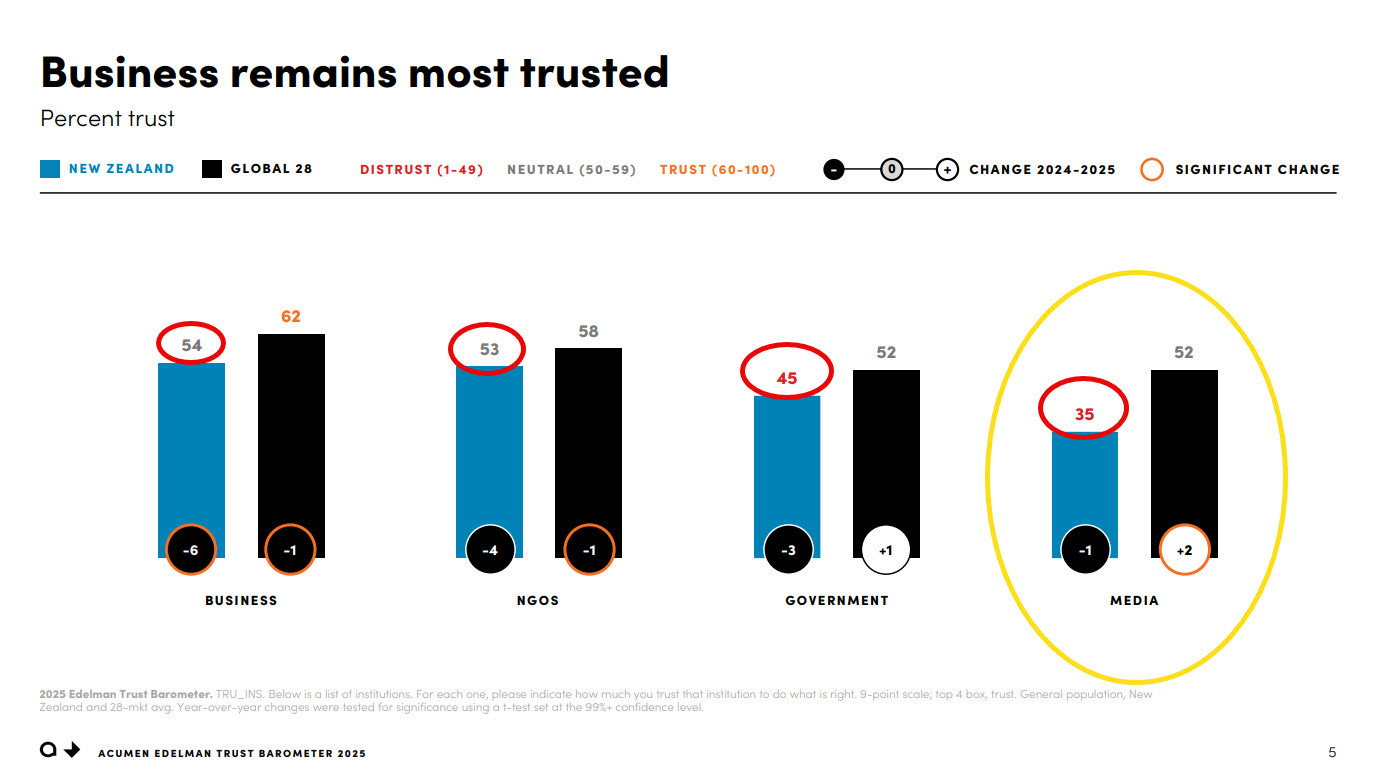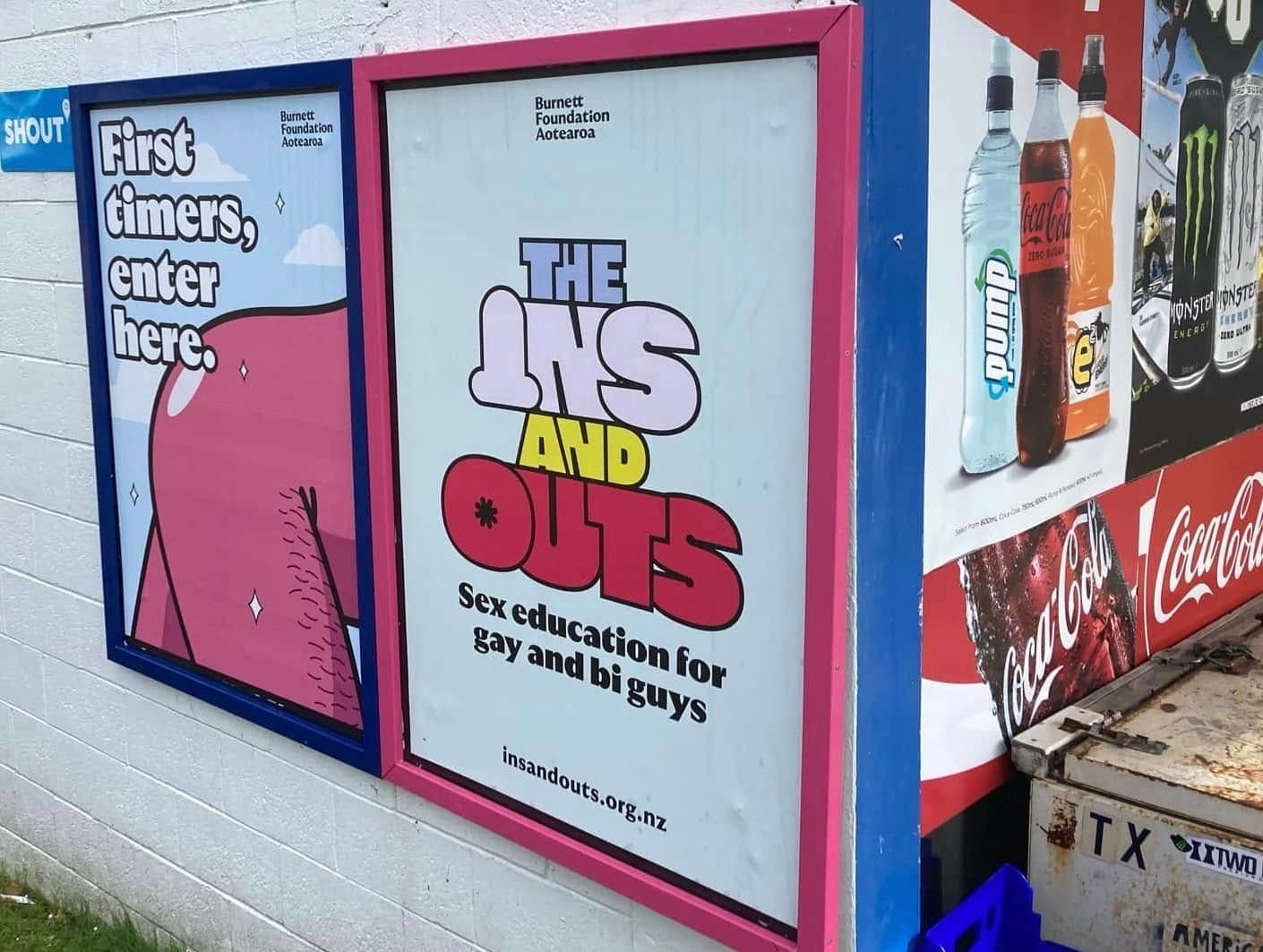“Trust Barometer” Gets Even Chillier Towards Media
A new poll continues to confirm the severe lack of trust that the NZ public has in the mainstream legacy news media. And a recent decision by the BSA confirms just how bad the reporting has got.
In its 25th year, the Edelman Trust Barometer is a global study published every January that covers a range of timely and important societal indicators of trust among business, media, government and NGOs, shaping conversations for the upcoming year. More than 33,000 people took part in the 2025 global survey across 28 markets.
Additionally, the Edelman Trust Institute also conducted the 2025 Trust Barometer research among 1,150 respondents from Aotearoa New Zealand in partnership with Acumen. The Trust Index (average level of trust across business, NGOs, government and media) in New Zealand has been declining incrementally since 2022 and for the first time since 2022 the Trust Index puts us in the distrust category. Australia too has moved from neutral to distrust in the last year. Many of our major trading partners are also firmly in the distrust category, including Japan, the United Kingdom and the United States.
I want to look specifically at the media – but there’s also a couple of other interesting results as well.
The 2025 Trust Barometer shows only 19% of New Zealanders believe the next generation will be better off compared to today, with the global average sitting at 36%. There is also intense scepticism of government officials, business leaders and journalists with on average 61% reporting they worry about the leaders purposely trying to mislead people by saying things they know are false, and 68% say it’s becoming harder to tell if the news being reported was produced by a respectable source or an individual trying to deceive people…. The levels of trust felt in the lower income brackets has been relatively stable for the past four years, but where we have seen a substantial decline is in the higher income levels.
You can see that our trust in general of institutions has dropped from the middle of the pack to the bottom section – on the same score as the US. So we better stop pointing the finger eh! 😊
Here's the key result. While trust in media has slightly increased worldwide, trust in NZ media continues to slide.
So here’s the data from two years ago – 2023. Media has lowest trust of all brands and organisations – sitting at 41%. But worldwide, it averages 50% - so we’re disproportionately low. So remember that 41%.
Fast forward to the latest data out
We have dropped to 35% - from 41% two years ago. (The drop they show is compared to last year). So it’s been a gradual drop over the years.
But note the “global” rate. It’s increased!
Trust in news media worldwide has actually increased on average. NZ has gone against the trend – which is a real slight on our media, isn’t it.
Media are even less trusted than politicians and government! That’s saying something 😊
Which group purposely misleads people by saying things they know are false or gross exaggerations?
Once again, journalists and reporters win the race – although all groups are increasing.
Worldwide, the countries that also had the most mistrust in their media were Thailand, India, Spain, Australia, Brazil, Malaysia, Singapore, US, Argentina and Columbia.
Most trust in media was Japan, Kenya, Sweden, Saudi Arabia and Netherlands.
There was another question about trust in all news sources. Now this survey result doesn’t include New Zealand – but it does show a worldwide trend
Surprisingly, search engines were most trust at 63% - that’s 2 in 3 people who trust them – (perhaps we need to do a bit more educating on how search engines such as Google can’t always be trusted!) – followed by traditional media then private media, and social media.
Which is interesting. We’re always told about how Facebook and X push so-called disinformation and misinformation – in other words, stuff the liberal left of politics don’t agree with – but most of us can discern that you should necessarily trust everything you read. And that’s a good thing.
We’re all just realising that with news media now.
Just before I show you an example of our news media being called out by their own watchdog, here’s a couple of other interesting results from the Trust Barometer.
A sense of grievance is taking hold in New Zealand, with 67% of New Zealanders expressing a moderate or higher sense of grievance, a figure that surpasses the global average of 61%. This is defined by a belief that government and business harm them and serve narrow interests, and ultimately the wealthy benefit while the regular people struggle.
That’s us there rounding out the top 10. We’re 67%. The global average is 61%.
Another interesting result was that 24% of NZers say that hostile activism is a viable means to drive change. Over 1 in 3 young adults approve of hostile activism.
Although, I would warn caution on this result because the pollsters have lumped threatening or committing violence or damage to property with “spreading disinformation” and “attacking people online”. There’s quite a contrast there – but the fact that 12-13% say that violence or damage to property is okay is a worry.
It also seems that the word “discrimination” has become cool, and we almost all need to fear it. In all demographics – gender, age, income – there has been an increase in the “worry about experiencing prejudice, discrimination, or racism”.
I wonder how much that is being driven by the media, or perhaps by schools and academics with critical race theory and the minorities, intersectionality and oppressors v oppressed.
Or perhaps we’re all just becoming snowflakes.
And this one won’t surprise you – although it doesn’t include NZ
The majority of countries don’t trust the UN. Classic. It would be interesting to know what NZers thought, actually.
So back to our media trust issue.
The BSA has just released a decision on some news coverage by the 6pm news on TV3 – ThreeNews – which is provided by Stuff.
The BSA has upheld two complaints from Action for Smokefree 2025 (ASH) about two ThreeNews items reporting concerns about ASH….
The two news items aired in the last week of July 2024, in 6pm bulletins on ThreeNews…
The first item aired on 26 July 2024 and was presented as a “special investigation” into concerns about alleged links between ASH and the “pro-vaping” lobby in Australia. The BSA found it breached the fairness, balance and accuracy standards.
“The broadcast created a misleading, unbalanced and unfairly negative impression of the complainant, by favouring particular (critical) perspectives, while failing to adequately present ASH’s position in response – despite this having been discussed at length during an un-aired 30-minute interview. This undermined the public interest in the story as the audience did not have the benefit of hearing both sides.
“The reporter did not fairly inform ASH about the nature of the story or ASH’s contribution to it; ASH’s comments on the issues were not fairly presented, meaning the item was unbalanced; and, collectively, a number of statements and the presentation of ASH’s position created a misleading and unfairly negative impression of ASH,” the BSA said.
Wow – that is damning. But there was another item four days later!
The second item, four days later on 30 July 2024, reported a school had “refused to allow” its students to take part in ASH’s annual Year 10 Vaping Survey due to concerns about ASH’s stance on youth vaping. The BSA found it was misleading and unfair to ASH and its director, as the item’s live cross format presented this as ‘breaking news’ but did not disclose the relevant email from the school was from 2021.
“The broadcaster did not make reasonable efforts to ensure accuracy, by failing to report important factual context which would have significantly altered viewers’ understanding of the item; and the single comment included from ASH failed to respond to the issues and unfairly portrayed ASH in a negative light,” the Authority said.
“The failure to include relevant and important information, and to adequately include comment from ASH that responded to the thrust of the story, demonstrates shortfalls in editorial processes and oversight on this occasion, in breach of the accuracy and fairness standards.”
Both broadcasts “fell well short of the journalistic standards we believe New Zealand audiences expect from news programmes”, the BSA said.
“Together, they demonstrated a continued narrative favouring perspectives that were strongly critical of ASH, while failing to fairly present the other side of the story.”
Shocking. Truly shocking. I think the BSA nailed it when they referred to “journalistic standards we believe New Zealand audiences expect from news programmes”.
The problem is that we don’t expect that standard any more.
The Edelman Trust Barometer along with all the other surveys confirms that.
By the way, you’re probably saying right now – Bob, I never heard about this survey in the news.
There was one that I saw. Newstalk ZB – but the focus was on general trust.
It’s a sorry state of news media, isn’t it.
Now while I was recovering from my eye infection, the story of Green MP Benjamin Doyle happened. It had been brewing for four days on social media with concerns about the social media postings of the MP involving sexualised terms and sexualised images.
But I already knew this was a disaster waiting to happen because Doyle had previously worked for the Burnett Foundation – formerly the AIDS foundation.
Yep, that grubby hedonistic narcissistic government funded organisation that put those anal sex posters up outside dairies – until you and I kicked up such a stink that they got removed.
But that’s his background.
It got to the point where the legacy media couldn’t NOT talk about it.
So within 30 minutes of each other, here was their angle. Doyle was the victim.
The media marching in step with each other to push a certain narrative.
And they wonder why nobody trusts them anymore.







As high as 35%? We don't hate the Mainstream Media enough.